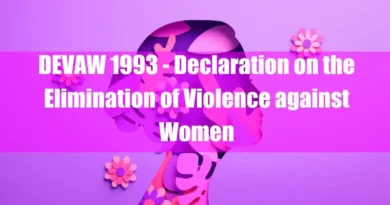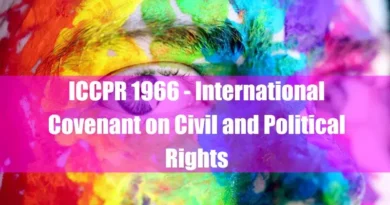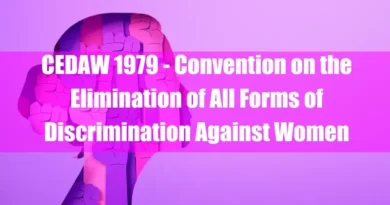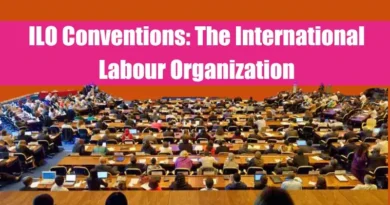ICESCR 1966 – International Covenant on Economic, Social, and Cultural Rights
Takeaways
| Key Points |
|---|
| The ICESCR outlines key principles and rights to ensure economic, social, and cultural justice globally, structured into five parts with 31 articles. |
| It emphasizes the right to self-determination, enabling peoples to freely determine their political status and pursue development. |
| State obligations include ensuring non-discrimination, progressively realizing rights based on available resources, and avoiding regressive measures that undermine progress. |
| Protected rights include work under fair conditions, social security, family protection, adequate living standards, health, education, and participation in cultural life, supported by mechanisms for reporting and monitoring compliance. |
| To fulfill these obligations, states must implement legislative, administrative, and policy measures, adopt social programs, and engage in international cooperation, ensuring the rights are upheld for all individuals. |
Introduction to ICESCR 1966
Brief overview and historical context
The International Covenant on Economic, Social, and Cultural Rights (ICESCR) was adopted by the United Nations General Assembly on December 16, 1966, and entered into force on January 3, 1976.
The covenant was established to protect individuals’ economic, social, and cultural rights, complementing the International Covenant on Civil and Political Rights (ICCPR). These documents and the Universal Declaration of Human Rights (UDHR) form the International Bill of Human Rights.
The ICESCR emerged from the post-World War II recognition that economic and social rights were vital for ensuring human dignity and global stability.
Relationship with the Universal Declaration of Human Rights (UDHR) and the International Covenant on Civil and Political Rights (ICCPR)
The ICESCR is deeply rooted in the principles of the UDHR, which was proclaimed in 1948 as a common standard of achievement for all peoples and nations. While the UDHR outlined a broad spectrum of rights, the ICESCR and the ICCPR were created to provide a legally binding framework for these rights.
The ICCPR focuses on civil and political rights, such as freedom of speech and the right to a fair trial. In contrast, the ICESCR addresses rights related to living conditions, including the right to work, education, and an adequate standard of living.
These covenants reflect the indivisibility and interdependence of all human rights, emphasizing that civil and political rights cannot be fully realized without economic, social, and cultural rights.
The Structure of the ICESCR
Division into Parts and Articles
The ICESCR is structured into five parts, comprising a preamble and thirty-one articles. This structured approach ensures clarity in the rights it seeks to protect and its obligations to state parties.
- Part I: Article 1 of the ICESCR addresses the right of all peoples to self-determination. This includes the right to freely determine their political status and pursue economic, social, and cultural development.
- Part II: Articles 2 to 5 set out the obligations of state parties to ensure the rights recognized in the covenant are realized without discrimination. It also establishes the principle of progressive realization, acknowledging that some rights may be achieved gradually.
- Part III: Articles 6 to 15 list the specific rights protected under the ICESCR. These include the rights to work, social security, family protection, an adequate standard of living, health, education, and participation in cultural life.
- Part IV: Articles 16 to 25 outline the reporting and monitoring mechanisms. States parties must submit regular reports on how the rights are being implemented.
- Part V: Articles 26 to 31 cover the technical aspects of the covenant, including ratification, entry into force, and procedures for amendment.

Key features and organizational structure
The organizational structure of the ICESCR is designed to clearly delineate the rights it protects and the responsibilities it places on state parties. The covenant emphasizes non-discrimination and progressive realization as central tenets. Non-discrimination ensures that all individuals can enjoy the rights outlined without bias.
At the same time, progressive realization allows states to achieve these rights gradually, acknowledging different levels of development and available resources. The covenant also establishes a framework for monitoring compliance through the Committee on Economic, Social, and Cultural Rights (CESCR), which reviews state reports and provides recommendations.
Core Principles
Principle of Progressive Realization
The principle of progressive realization is a cornerstone of the ICESCR. It recognizes that while some economic, social, and cultural rights may not be immediately attainable due to resource constraints, states must take steps toward their full realization. This principle requires states to use the maximum available resources to achieve these rights over time.
It also mandates that states refrain from taking regressive measures that could undermine the progress already made.

Non-Discrimination and Equality
Non-discrimination and equality are fundamental principles embedded in the ICESCR. The covenant mandates that the rights enshrined within it must be guaranteed to all individuals without discrimination based on race, color, sex, language, religion, political or other opinions, national or social origin, property, birth, or other status.
This principle is crucial in ensuring that marginalized groups, often most vulnerable to economic and social inequalities, are afforded equal protection and opportunities.
Rights Enshrined in the ICESCR
Right to Self-Determination (Article 1)
Article 1 of the ICESCR affirms the right of all peoples to self-determination, a principle also reflected in the ICCPR. This right empowers people to freely determine their political status and pursue economic, social, and cultural development. This article obligates state parties to respect and promote self-determination in their policies and practices.
Economic Rights
Right to work and fair conditions (Articles 6–8)
The ICESCR guarantees the right to work under conditions that ensure dignity and security. Article 6 acknowledges everyone’s right to the opportunity to earn a living by work they freely choose or accept. Articles 7 and 8 build on this by setting out the rights to fair wages, safe working conditions, equal pay for equal work, and the right to form and join trade unions.

Right to social security (Article 9)
Article 9 of the ICESCR establishes the right to social security, including social insurance. This right is fundamental to protecting individuals against life risks such as unemployment, illness, disability, and old age, ensuring everyone can maintain an adequate standard of living.
Social Rights
Protection of the family and children (Article 10)
Article 10 emphasizes the importance of the family as the natural and fundamental group unit of society. It calls for the widest possible protection and assistance to the family, particularly while it is responsible for the care and education of dependent children. It also mandates special protection for mothers before and after childbirth and prohibits child labor that is harmful to a child’s health or moral development.
Right to an adequate standard of living (Article 11)
Article 11 recognizes everyone’s right to an adequate standard of living, including adequate food, clothing, and housing, and to the continuous improvement of living conditions. This article places a significant obligation on states to take appropriate steps to ensure that these rights are progressively realized for all individuals.
Cultural Rights
Right to participate in cultural life (Article 15)
Article 15 acknowledges everyone’s right to participate in cultural life, enjoy the benefits of scientific progress, and benefit from the protection of moral and material interests resulting from any scientific, literary, or artistic production of which they are the author.
Right to Health (Article 12)
Article 12 of the ICESCR recognizes everyone’s right to enjoy the highest attainable physical and mental health standards. It obliges state parties to reduce infant mortality, improve environmental and industrial hygiene, prevent and treat diseases, and create conditions to ensure access to medical services for all.
Right to Education (Articles 13–14)
Articles 13 and 14 of the ICESCR recognize the right to education, emphasizing that education is key to the full development of the human personality and dignity. The covenant mandates that primary education should be compulsory and free for all. In contrast, secondary and higher education should be accessible based on capacity, progressively achieving free education at these levels.

State Obligations Under the ICESCR
Immediate vs. Progressive Obligations
The ICESCR distinguishes between immediate obligations and those that can be progressively realized. Immediate obligations include the commitment to ensure non-discrimination in exercising rights and the duty to take steps toward fully realizing the rights recognized in the covenant.
The principle of progressive realization acknowledges that full implementation of economic, social, and cultural rights may take time, depending on the state’s available resources. However, this does not mean that states can delay action indefinitely.
They must take deliberate, concrete, and targeted steps toward fulfilling these rights. Importantly, states must avoid taking regressive measures that diminish the current enjoyment of rights.
Legal and practical steps required of state parties
To meet their obligations under the ICESCR, states must adopt a combination of legislative, administrative, and policy measures.
These include enacting laws that protect the rights enshrined in the covenant, establishing institutions that monitor and enforce these rights, and creating programs that address the social and economic needs of the population. For example, states might implement social security systems, promote access to education, and ensure fair labor practices. Additionally, states are encouraged to engage in international cooperation to support realizing economic, social, and cultural rights, particularly in developing countries.

Monitoring and Reporting Mechanisms
Role of the Committee on Economic, Social, and Cultural Rights (CESCR)
The Committee on Economic, Social, and Cultural Rights (CESCR) is the body responsible for monitoring the implementation of the ICESCR. Established in 1985, the CESCR is composed of 18 independent experts who are elected for four-year terms by the states parties to the covenant.
The committee’s primary role is to review the periodic reports submitted by states parties on how they are implementing the rights enshrined in the ICESCR.
The CESCR examines these reports, provides feedback, and issues concluding observations that highlight areas of concern and recommend measures for improvement. These observations are not legally binding but carry significant moral and political weight, encouraging states to comply with their obligations under the covenant.
Reporting process and state compliance
States parties must submit an initial report within two years of ratifying the ICESCR and periodic reports every five years. These reports must detail the measures taken to implement the rights recognized in the covenant and the challenges encountered.
The CESCR reviews these reports in public sessions, where state representatives may be questioned about their efforts to fulfill their obligations. Following the review, the committee issues its concluding observations, which include an assessment of the state’s progress and recommendations for further action.
In addition to the reporting process, the CESCR can issue general comments, which provide authoritative interpretations of the covenant’s provisions.
These comments are intended to guide states in their implementation efforts and clarify the scope of their obligations under the ICESCR.

Challenges and Criticisms
Issues in implementation and enforcement
One of the primary challenges associated with the ICESCR is the difficulty in implementing and enforcing its provisions. Unlike civil and political rights, which can often be enforced through judicial mechanisms, economic, social, and cultural rights are more complex and require sustained policy efforts and resources. The principle of progressive realization, while acknowledging the realities of resource constraints, can sometimes lead to delayed implementation, particularly in states with limited economic capacity.
Moreover, the lack of a strong enforcement mechanism has been criticized. The CESCR’s role is primarily advisory, and its recommendations, though influential, are not binding.
This has led to concerns about the effectiveness of the covenant in holding states accountable for their obligations.
Debates around the justiciability of economic, social, and cultural rights
The justiciability of economic, social, and cultural rights—the ability to enforce these rights through courts—remains a contentious issue.
Critics argue that these rights inherently differ from civil and political rights, which are more straightforward to adjudicate. Economic, social, and cultural rights often require positive state action and resource allocation, making them more challenging to enforce through legal means.
Proponents, however, argue that these rights are just as fundamental and that legal mechanisms should be developed to ensure their protection. Some countries have made progress in this area, incorporating economic, social, and cultural rights into their constitutions and allowing for their enforcement through national courts.
Nonetheless, the debate continues, particularly in contexts where resources are scarce and governments face competing priorities.
Conclusion
The ICESCR 1966 remains a vital component of the international human rights framework, emphasizing the importance of economic, social, and cultural rights in achieving human dignity and global justice.
While challenges in implementation and enforcement persist, the covenant’s principles continue to inspire efforts towards a more equitable world where all individuals can enjoy their full range of human rights.
The ongoing work of the CESCR, along with national and international advocacy, plays a crucial role in advancing these rights and addressing the inequalities that threaten their realization.
FAQ
What is the International Covenant on Economic, Social, and Cultural Rights (ICESCR)?
The ICESCR is a multilateral treaty adopted by the United Nations General Assembly in 1966 and effective from 1976. It commits participating states to uphold rights related to work, social security, family life, adequate living standards, health, education, and cultural participation.
Which rights are protected under the ICESCR?
The ICESCR safeguards rights, including:
- Right to work under just conditions
- Right to social security
- Protection of family life
- Adequate standard of living (food, clothing, housing)
- The highest attainable standard of health
- Right to education
- Participation in cultural life
How does the ICESCR define the right to work?
The ICESCR recognizes everyone’s right to the opportunity to earn a living by work, which they freely choose or accept. It mandates states to take appropriate steps to safeguard this right, including technical and vocational guidance and training programs.
What obligations do states have regarding the right to education under the ICESCR?
States must provide free, compulsory primary education for all, make secondary education generally available and accessible, and ensure higher education is equally accessible based on capacity. They should also develop a system of schools and ensure the material conditions of teaching staff are continuously improved.
How does the ICESCR address the right to health?
The Covenant recognizes everyone’s right to the enjoyment of the highest attainable standard of physical and mental health. States are required to take steps to achieve the full realization of this right, including those necessary for the prevention, treatment, and control of epidemic, endemic, occupational, and other diseases.
What is the principle of “progressive realization” in the ICESCR?
The “progressive realization” principle acknowledges that the full realization of economic, social, and cultural rights may be achieved over time. States are obligated to take steps, to the maximum of their available resources, to realize these rights progressively fully.
How does the ICESCR ensure non-discrimination?
The Covenant mandates that the rights enunciated will be exercised without discrimination of any kind, such as race, color, sex, language, religion, political or other opinion, national or social origin, property, birth, or other status.
What is the role of the Committee on Economic, Social, and Cultural Rights (CESCR)?
The CESCR monitors the implementation of the ICESCR by its States parties. It reviews reports submitted by states and issues general comments to provide interpretation and guidance on the provisions of the Covenant.
How are violations of the ICESCR addressed?
While the ICESCR lacks a direct enforcement mechanism, the CESCR reviews state reports and can issue recommendations. Additionally, the Optional Protocol to the ICESCR allows for individual complaints to be submitted to the CESCR, provided the state has ratified the protocol.
How does the ICESCR relate to the Universal Declaration of Human Rights (UDHR)?
The ICESCR, along with the International Covenant on Civil and Political Rights (ICCPR) and the UDHR, forms the International Bill of Human Rights. While the UDHR is a non-binding declaration, the ICESCR, and ICCPR are legally binding treaties that elaborate on the rights outlined in the UDHR.
What is the significance of Article 1 in the ICESCR?
Article 1 recognizes the right of all peoples to self-determination, allowing them to freely determine their political status and pursue their economic, social, and cultural development. It also emphasizes their right to dispose of their natural wealth and resources freely.
How does the ICESCR address the right to social security?
The Covenant acknowledges everyone’s right to social security, including social insurance. States must take appropriate steps to ensure this right is fully realized for all individuals.
What provisions does the ICESCR make for family protection?
The ICESCR emphasizes the widest possible protection and assistance to the family, recognizing it as society’s natural and fundamental group unit. It mandates special protection for mothers during a reasonable period before and after childbirth and calls for measures to protect children from economic and social exploitation.
How does the ICESCR promote cultural rights?
The Covenant recognizes everyone’s right to take part in cultural life, enjoy the benefits of scientific progress, and benefit from the protection of moral and material interests resulting from any scientific, literary, or artistic production.
What is the Optional Protocol to the ICESCR?
Adopted in 2008, the Optional Protocol establishes a complaint mechanism allowing individuals or groups to submit communications to the CESCR regarding violations of the rights enshrined in the Covenant, provided the state concerned has ratified the protocol.
How does the ICESCR address the right to adequate housing?
The ICESCR recognizes the right to an adequate standard of living, including adequate housing. This encompasses more than just shelter; it includes legal security of tenure, availability of services, affordability, habitability, accessibility, location, and cultural adequacy. States are obligated to take appropriate steps to ensure this right is realized.
What is the significance of General Comment No. 4 by the CESCR?
General Comment No. 4 provides an authoritative interpretation of the right to adequate housing under Article 11(1) of the ICESCR. It outlines the essential aspects of this right, including legal security of tenure, availability of services, affordability, habitability, accessibility, location, and cultural adequacy.
How does the ICESCR promote the right to food?
The ICESCR recognizes the right to adequate food as part of the right to an adequate standard of living. States must take steps to improve methods of production, conservation, and distribution of food, ensuring equitable distribution of world food supplies in relation to need.
How does the ICESCR address the right to water?
While not explicitly mentioned, the right to water is derived from the right to an adequate standard of living. The CESCR’s General Comment No. 15 interprets this to mean that water is indispensable for leading a life in human dignity and is a prerequisite for realizing other rights.
How does the ICESCR protect labor rights?
The ICESCR recognizes the right to work, which includes everyone’s right to the opportunity to earn a living by work, which they freely choose or accept. It also acknowledges the right to just and favorable work conditions, including fair wages, safe working conditions, and equal opportunity for everyone to be promoted in their employment.









